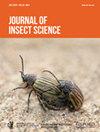Tamarixia triozae (Hymenoptera: Eulophidae)-Bactericera cockerelli (Hemiptera: Triozidae)系统中寄生虫-寄主相互作用行为与寄主阶段的关系
IF 2.1
3区 农林科学
Q1 ENTOMOLOGY
引用次数: 0
摘要
以寄主为食的寄生蜂的雌蜂经常将不同阶段的寄主分开取食和寄生,但其基本行为机制大多不为人知,因此很难评估寄生蜂与寄主的相互作用及其对生物防治成功率的影响。Tamarixia triozae(Burks)是番茄-马铃薯蚜虫 Bactericera cockerelli (Šulc) 的一种外寄生虫,它利用若虫并通过寄生和取食寄主杀死若虫。在这项研究中,我们让雌蜂同时接触1-5龄若虫,并对寄生虫与宿主的相互作用进行了13小时的连续视频记录。然后,我们量化了寄主阶段性取食和产卵的处理时间,以及从遇到寄生虫到成功取食和产卵的寄生虫攻击和寄主防御行为。雌蜂更有可能遇到年长的寄主并对其进行评估。然而,相遇和评估并不一定导致取食和产卵的成功。我们的研究结果表明:(i)三裂喙小蜂在评估阶段后继续用产卵器评估宿主;(ii)雌蜂更喜欢中龄宿主进行刺穿取食,晚龄宿主进行探卵和产卵;(iii)宿主特定阶段的营养价值、外皮厚度和防御行为共同决定了取食攻击的成功率;(iv)寄生后代的最佳宿主资源决定了产卵的宿主阶段选择。这项研究有助于我们了解寄生虫与寄主的相互作用以及寄主阶段选择背后的机制。本文章由计算机程序翻译,如有差异,请以英文原文为准。
Parasitoid–host interaction behaviors in relation to host stages in the Tamarixia triozae (Hymenoptera: Eulophidae)–Bactericera cockerelli (Hemiptera: Triozidae) system
Females of host-feeding parasitic wasps often partition hosts of different stages for feeding and parasitization, but the underlying behavioral mechanisms are largely unknown, making it difficult to evaluate parasitoid–host interactions and their effects on biological control success. Tamarixia triozae (Burks) is an ectoparasitoid of tomato-potato psyllid Bactericera cockerelli (Šulc), which utilizes nymphs and kills them both by parasitization and host feeding. In this study, we exposed female wasps to 1st- to 5th-instar psyllid nymphs simultaneously and made 13-h continuous video recording of parasitoid–host interactions. We then quantified host stage-dependent handling time for feeding and oviposition and behaviors of parasitoid attacks and host defenses from encountering to successful feeding and oviposition. Female wasps were more likely to encounter and evaluate older hosts. However, the encounter and evaluation did not necessarily result in the success of feeding and oviposition. Our findings suggest that (i) T. triozae continues to assess the host using its ovipositor after the evaluation phase, (ii) females prefer the mid-aged hosts for feeding piercing and feeding and the later instars for oviposition probing and oviposition, (iii) the combination of stage-specific host nutrition value, integument thickness and defense behavior determines the success of feeding attacks, and (iv) the optimal host resource for parasitoid offspring fitness defines host stage selection for oviposition. This study contributes to our understanding of parasitoid–host interactions and mechanisms behind host stage selections.
求助全文
通过发布文献求助,成功后即可免费获取论文全文。
去求助
来源期刊

Journal of Insect Science
生物-昆虫学
CiteScore
3.70
自引率
0.00%
发文量
80
审稿时长
7.5 months
期刊介绍:
The Journal of Insect Science was founded with support from the University of Arizona library in 2001 by Dr. Henry Hagedorn, who served as editor-in-chief until his death in January 2014. The Entomological Society of America was very pleased to add the Journal of Insect Science to its publishing portfolio in 2014. The fully open access journal publishes papers in all aspects of the biology of insects and other arthropods from the molecular to the ecological, and their agricultural and medical impact.
 求助内容:
求助内容: 应助结果提醒方式:
应助结果提醒方式:


